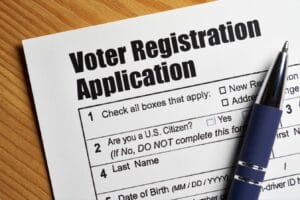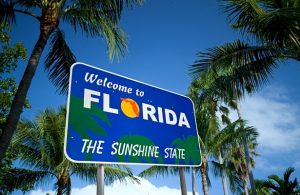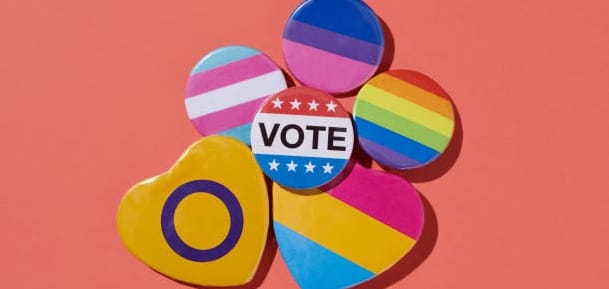Florida legislators concluded the 2024 session one week ago adjourning for the year, with 21 out of 22 anti-LGBTQ bills defeated or neutralized. The broadscale defeat follows years of escalating and baseless targeting by extremist lawmakers, brought down by tireless advocacy from Equality Florida and thousands of LGBTQ and ally Floridians.
Florida is also turning a corner toward justice following a settlement in its notorious “Don’t Say LGBTQ” law, court rulings blocking other harmful, unconstitutional and discriminatory laws, the disintegration of Florida-headquartered book banning extremists Moms for Liberty, and new efforts to finally curb the wildfire of book banning across the state that has been led by a handful of fringe activists – up to 600 book challenges were initiated by just two people, according to reports.
The only explicitly anti-LGBTQ bill that did pass, HB 1291, restricts curricula for educator preparation programs and courses and bans DEI-style mandated trainings for teachers. It is similar to previous policies that sought to remove instruction on systemic racism, sexism, and historical oppression from public schools. A business-specific version of the law has already been ruled unconstitutional and blocked in federal court.
Equality Florida — along with many of our partners — organized rallies at the Capitol to fight back against 22 anti-LGBTQ+ bills this session: https://t.co/XRi5Huul6Q pic.twitter.com/JAr3oWY6ki
— Equality Florida (@equalityfl) March 15, 2024
In its wrap-up of the session, Equality Florida, the state’s leading LGBTQ advocacy organization wrote: “Florida’s 60-Day Legislative Session has officially come to an end — and together, we’ve claimed numerous victories to achieve the impossible! … By making our voices heard, we stopped or neutralized 21 of the 22 bills with our intense, collective opposition! And the one bill that did pass, Stop WOKE Teacher Training (HB 1291), is very likely unconstitutional. We even passed the FIRST pro-LGBTQ bill in recent history, PEP Access (HB 159)! Incredibly hard work went into accomplishing this major win for our community. It took thousands of people, like you, joining us by contacting lawmakers, showing up to every committee hearing, and being in the Florida Capitol every single day. … This session we proved beyond a doubt that our voices matter, our actions matter, and our movement matters. Although our work isn’t over, this is a time to celebrate our victories and reflect on the power of our collective action. Together, we resisted and we made a difference.”
This year’s session followed years of unprecedented attacks against LGBTQ and racial equality, led in large part by Governor Ron DeSantis’ administration. GLAAD has documented DeSantis’ record of policy and misinformation against LGBTQ people, including some of the most extreme anti-LGBTQ policies in American history, such as a continually expanding bill to prohibit discussion of LGBTQ people, issues, or history in schools; a ban on allowing transgender students to play sports, be addressed by their proper names and pronouns, or use the appropriate restrooms; a ban on health care for transgender people that imposes criminal penalties on medical professionals who seek to provide such care; and an extreme ban on abortion.
The fact that only one out of 22 dangerous anti-LGBTQ bills advanced in Florida this year may be due in part to DeSantis’ months-long departure from the state to focus on his failed presidential run. DeSantis suspended his presidential campaign following a poor showing during the Iowa caucuses, garnering only 21% of the vote despite visiting every county in Iowa and after pouring into it an estimated $35 million and significant staff resources.
“DeSantis’ decisive failures as a presidential candidate were also a national rebuke of his wasteful, cruel record in Florida,” said GLAAD’s President and CEO Sarah Kate Ellis (she/her). “Voters recognized the power of their own voices to speak up and turn out against selfish candidates and campaigns that do nothing to protect everyone’s freedoms and prosperity.”

In a promising move, Florida lawmakers this year advanced policies to curb the epidemic of book banning extremists unleashed across the state’s libraries and classrooms. HB 1285 limits book challenges by people who do not have children enrolled in the school district to one challenge per month, and imposes monetary penalties for failed book challenges. The bill is on its way to Governor DeSantis’ desk after passing through the House and Senate. The state Department of Education is similarly weighing penalties against principals who withhold fair access to books, steps designed to reverse course on overreach and intrusion in public schools.
The Florida-based book banning extremist group Moms for Liberty, which had an early boost by aligning with Gov. DeSantis and by its founder’s marriage to disgraced former Florida GOP Chairman Christian Ziegler, continues to suffer electoral and reputation-wrecking losses. Ziegler was accused of raping a woman that he and his wife Bridget Ziegler, Sarasota School Board member, had a consensual three-way sexual relationship with. Community members continue to demand that Bridget Ziegler resign from the school board, and Moms for Liberty co-founder Tina Descovich’s bid for a seat on the state ethics board was rejected because her employment with the extremist group could constitute lobbying.
Immediately following the end of session, Florida families also won a historic court victory on Monday in a settlement with the Florida State Board of Education that removes significant discriminatory provisions from the state’s infamous anti-LGBTQ school censorship law, commonly known as the “Don’t Say LGBTQ” law. Championed by DeSantis, the governor signed the first-of-its-kind law in March 2022 and it inspired similar laws in a number of states. While the law still bans LGBTQ issues from being a part of formal curricula, the revised version clarifies that it must be applied neutrally and is no license to discriminate against or erase LGBTQ families. It allows students to speak and write freely about LGBTQ people and issues in classwork and school participation; and makes clear that educators and students aren’t prohibited from mentioning LGBTQ people and issues outside of instruction. The settlement also ensures anti-bullying protections remain in effect, and that schools are welcome to reinstate LGBTQ-inclusive clubs such as Gender and Sexuality Alliances (also known as Gay Straight Alliances).

This latest win follows a wave of momentum in the courts undoing unconstitutional legislative and administrative actions in Florida, including earlier this month that struck down a DeSantis-backed ban on diversity and race-based discussions in private workplaces — commonly known as the “Stop Woke Act” — as unconstitutional. A U.S. federal judge has also currently blocked from enforcement an extreme ban on health care for transgender youth and adults, which imposes criminal penalties on medical professionals who seek to provide appropriate care. The judge said the ban would cause “irreparable harm” to transgender youth, adding: “The treatment will affect the patients themselves, nobody else, and will cause the defendants no harm. The preliminary injunction will be consistent with, not adverse to, the public interest. Adherence to the Constitution is always in the public interest.” Another federal court blocked a ban on drag performers and performances for being overly broad and unconstitutional in its attempt to stifle free speech, expression, and the rights of parents.
An estimated 898,000 LGBTQ adults live in Florida according to the Williams Institute of UCLA, representing 5.4% of the overall LGBTQ population in the United States not including youth. To learn more and stay up to date on actions you can take to protect LGBTQ Floridians, follow Equality Florida on X at www.twitter.com/equalityFL. View GLAAD’s 2024 election fact sheet on Florida here: https://glaad.org/election-2024-florida-fact-sheet/.













